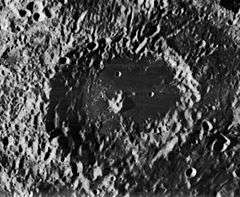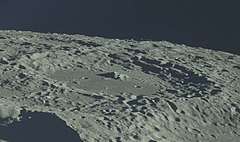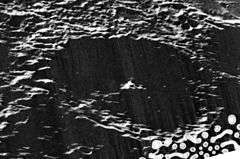Leeuwenhoek (crater)
Leeuwenhoek is a lunar impact crater that lies in the Moon's southern hemisphere, on the far side from the Earth. It is located to the east of the crater Birkeland and the unusual double crater Van de Graaff. To the northeast of Leeuwenhoek is Orlov and to the south is the large walled plain Leibnitz.
 Lunar Orbiter 2 image | |
| Coordinates | 29.3°S 178.7°W |
|---|---|
| Diameter | 125 km |
| Depth | 2.4 km |
| Colongitude | 180° at sunrise |
| Eponym | Antony van Leeuwenhoek |


The outer rim of Leeuwenhoek is worn and eroded, forming an irregular mountainous ring about the relatively level interior floor. The inner wall is wider along the western and southern sides, offsetting the floor to the northeast. At the midpoint of the interior is a central peak formation. There are a pair of small craterlets on the floor and several tiny craters. Leeuwenhoek partly overlaps the satellite crater Leeuwenhoek E to the northeast.
Satellite craters
By convention these features are identified on lunar maps by placing the letter on the side of the crater midpoint that is closest to Leeuwenhoek.
| Leeuwenhoek | Latitude | Longitude | Diameter |
|---|---|---|---|
| E | 28.2° S | 176.7° W | 117 km |
References
- Andersson, L. E.; Whitaker, E. A. (1982). NASA Catalogue of Lunar Nomenclature. NASA RP-1097.CS1 maint: ref=harv (link)
- Blue, Jennifer (July 25, 2007). "Gazetteer of Planetary Nomenclature". USGS. Retrieved 2007-08-05.CS1 maint: ref=harv (link)
- Bussey, B.; Spudis, P. (2004). The Clementine Atlas of the Moon. New York: Cambridge University Press. ISBN 978-0-521-81528-4.CS1 maint: ref=harv (link)
- Cocks, Elijah E.; Cocks, Josiah C. (1995). Who's Who on the Moon: A Biographical Dictionary of Lunar Nomenclature. Tudor Publishers. ISBN 978-0-936389-27-1.CS1 maint: ref=harv (link)
- McDowell, Jonathan (July 15, 2007). "Lunar Nomenclature". Jonathan's Space Report. Retrieved 2007-10-24.CS1 maint: ref=harv (link)
- Menzel, D. H.; Minnaert, M.; Levin, B.; Dollfus, A.; Bell, B. (1971). "Report on Lunar Nomenclature by the Working Group of Commission 17 of the IAU". Space Science Reviews. 12 (2): 136–186. Bibcode:1971SSRv...12..136M. doi:10.1007/BF00171763.CS1 maint: ref=harv (link)
- Moore, Patrick (2001). On the Moon. Sterling Publishing Co. ISBN 978-0-304-35469-6.CS1 maint: ref=harv (link)
- Price, Fred W. (1988). The Moon Observer's Handbook. Cambridge University Press. ISBN 978-0-521-33500-3.CS1 maint: ref=harv (link)
- Rükl, Antonín (1990). Atlas of the Moon. Kalmbach Books. ISBN 978-0-913135-17-4.CS1 maint: ref=harv (link)
- Webb, Rev. T. W. (1962). Celestial Objects for Common Telescopes (6th revised ed.). Dover. ISBN 978-0-486-20917-3.CS1 maint: ref=harv (link)
- Whitaker, Ewen A. (1999). Mapping and Naming the Moon. Cambridge University Press. ISBN 978-0-521-62248-6.CS1 maint: ref=harv (link)
- Wlasuk, Peter T. (2000). Observing the Moon. Springer. ISBN 978-1-85233-193-1.CS1 maint: ref=harv (link)